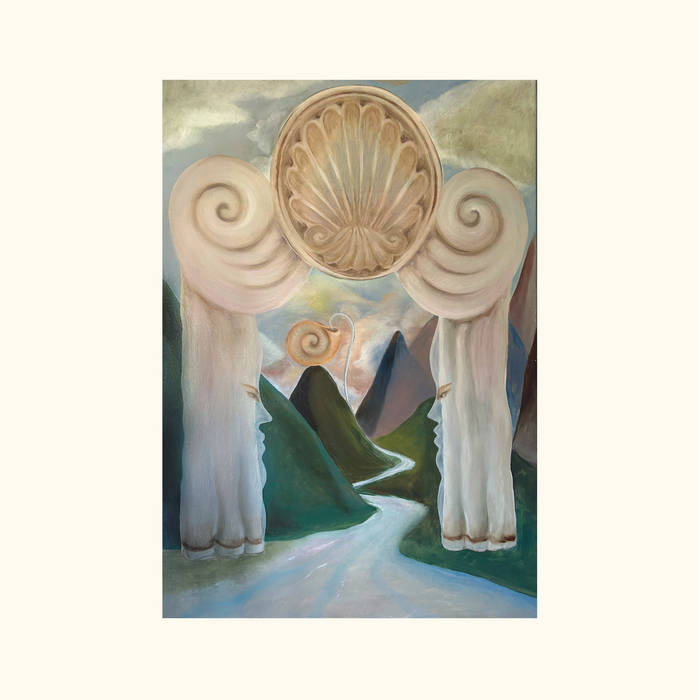The collaboration between Sofie Birch and Antonina Nowacka began through the Unsound Festival in 2021 when they first met during the Morning Glory concert series at the Kraków Synagogue at noon. This initial encounter quickly blossomed into the creation of Languoria, an album recorded in Copenhagen and released the following year. In 2024, the duo journeyed to Sokołowsko, a small town in Lower Silesia known for its unique microclimate and historic sanatorium founded in the 19th century. There, Birch and Nowacka deliberately disconnected from modern technology and compositional plans, venturing into the surrounding nature armed only with a guitar, a zither, and a portable Nagra reel-to-reel tape recorder.
Recording directly to tape in this remote, atmospheric environment, the two musicians sketched ideas spontaneously, using only their voices and instruments to reflect the natural world around them. Their singing weaves intricately with the acoustic strings, sometimes merging almost into a single voice. Yet it’s the spirit of Sokołowsko – the air, the light, the forest – that permeates the album, making the environment a living part of the music. The use of vintage recording gear and isolation from contemporary distractions allowed Birch and Nowacka to step outside the flow of modern life, evoking a sense of timelessness and a lost way of being, reminiscent of Hans Castorp’s retreat to the sanatorium in Thomas Mann’s The Magic Mountain.
This approach – embracing natural environments not just as backgrounds but as active collaborators – is echoed in other experimental works. Rafael Toral’s Aerial Piano recorded prepared piano in reverberant open spaces, allowing silence and air to shape the sound. Félicia Atkinson’s Everything Evaporate, recorded in the French Alps, blends analogue synths and whispered voices with field recordings of wind and wildlife, creating an immersive, porous listening experience. Masayoshi Fujita’s Stories used vibraphone and bells in semi-outdoor spaces, evoking forest stillness through ambient resonance. Paul Wirkus and Stefan Schneider’s Forest Full of Drums captures percussion outdoors, where the forest’s acoustics shape rhythm and tone.
The Hiraeth instrumentation is quite simple: zither, classical guitar, and the distinctive vocals of Birch and Nowacka. After their time in Sokołowsko, the duo returned to a Copenhagen studio in autumn to carefully layer subtle synths and organs, deepening the soundscape without overwhelming its fragile balance. Then, they expanded the sound to vintage synths like the DX7 and Minimoog, as well as vibraphone, percussion, steel drums, and pipe organ.
The album opens with ‘Rabbit’s Hole’, where reversed guitar and zither lines create an ambient sound that blurs the line between acoustic and electronic, conjuring an otherworldly atmosphere. ‘Heart of Waterfall’ follows with Birch’s delicate, steady guitar underpinning Nowacka’s impressionistic zither, evoking images of woodland spirits or sirens singing softly within a lush forest. On ‘Comes with Sunrise’, Minimoog synth and percussion introduce a dreamy, slightly surreal quality, merging analogue warmth with organic rhythms to evoke the sensation of a waking dream. The experimental heart of the album shines through in ‘Start on the Ground’, a free improvisation blending strings, diverse percussion (including steel drum), and a distant pipe organ, making it the album’s most exploratory and spontaneous piece.
Reverb adds spatial depth to tracks like ‘How About the Time?’ while ‘Love Object’ features minimalist guitar and steel drum alongside ethereal, impressionistic vocals, creating an intimate and haunting atmosphere. The album’s range spans from brief, focused miniatures to expansive, evolving compositions. In particular, ‘Collecting Eyes’ is a hypnotic, continuous soundscape with polyphonic voices and layered percussion, slowly unfolding over time. It recalls the organic acoustic improvisations of Animal Collective’s Sung Tungs (‘Visiting Friends’ especially) – another work by artists rooted in electronics yet embracing strictly acoustic endless motifs.
In Hiraeth, Birch and Nowacka’s music is a sonic embodiment of place and time – an exploration of habitat and intuition, recorded with reverence and spontaneity. Their journey to Sokołowsko was not unlike Hans Castorp’s retreat in The Magic Mountain, where healing and transformation arise from nature’s embrace. Indeed, as the Nobel laureate Olga Tokarczuk evoked in her novel Empuzjon (taking place in Sokołowsko itself), nature is a protagonist intertwined with human experience and expression.
In Mann’s book, the Italian Lodovico Settembrini instills Petrarch’s maxim to Hans Castorp: placet experiri – “it is pleasant to try”. In the case of Nowacka and Birch’s album, this can be taken as a trip to the forest in the countryside to try – making music – another way. Without a predetermined plan, the duo ventured out to find new places bathed in the sunset or midday light, discovering fresh tunings and melodies to capture on tape. The birds, the light, and even the wind against the harps became collaborators in their music, which feels meditative and healing – a true sound sanctuary born from deep listening and presence.


